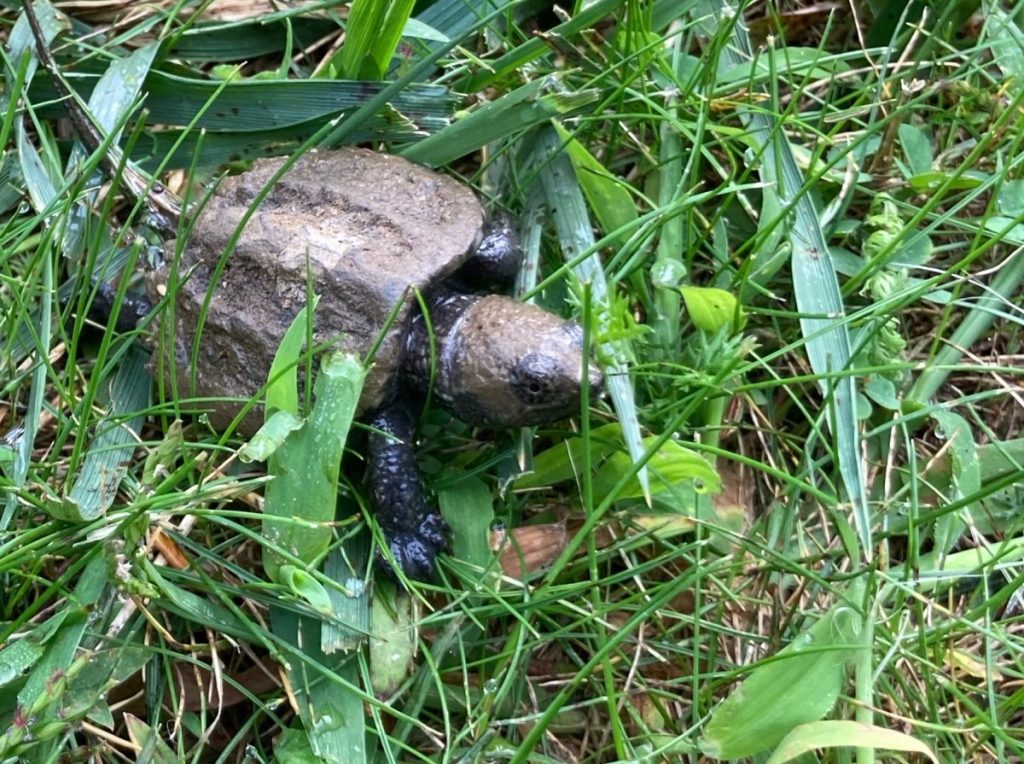A summer reflection by Liz Charles McGough, Director of Pilgrim Lodge for the Earth Care and Spirituality Resource Team of the Maine Conference United Church of Christ. Check out other spiritual reflections on their webpage.
There is an old mother snapping turtle named Gloria who has visited the banks of Pilgrim Lodge, the summer camp of the Maine Conference United Church of Christ, for a number of decades. It is a rare gift to catch sight of her drifting up to the waters edge there in Lake Cobbosseecontee, the ancestral waters of the Wabanaki people. She is oblivious to her power to clear the waterfront of swimming children who move to the docks to watch, in wonder, as she gracefully swims along.
While I have spent time at Pilgrim Lodge during the course of these decades, it has been many years since I’ve had the gift of a Gloria sighting. It was, therefore, a bit of thrill for me to step out of the camp office one morning in June to find a snapping turtle, most definitely a daughter of the great matriarch, exploring the watershed area to find a place to lay her eggs. She lumbered about on wrinkly, prehistoric legs, clawing a bit at the gravel to test the terrain for its worthiness to hold her nest, the potential of the next generation. A small group of the summer staff gathered to behold her activity as she looked back, a bit suspiciously, at us. We witnessed her presence that day, and then she was gone.
In that moment of watching this turtle I was filled with a sense of awe; wonder at the intimate opportunity to see this creature in her brief and bold foray on land. I was reminded of a piece that I had recently heard (1) about how the emotion of awe has the ability to reduce stress, calm the nervous system and boost our mood. Researcher Piercarlo Valdesolo of Claremont McKenna College explained that when witnessing something unexpected or unexplainable, “you realize there’s something bigger or beyond yourself. It makes your problems fade into the background. You become more concerned about the collective. You become more generous. You help more.”
While I treasure moments in the pristine wilderness where I can embrace the illusion of being in pure isolation, I actually love to watch humans interact with the natural world and how opening up to the presence of awe awakens us. I love seeing where the movements of human feet tread pathways to shared, well-loved places. I delight when I happen upon a fairy house in the woods, the manifestation of a child’s time spent interacting with materials offered up by the natural world mixed with their own imagination. I soak in the beauty of ferns growing up between the rocks of the labyrinth in the woods – ferns in their natural environment unfurling between the stones left behind thoughtfully, carefully, to mark someone’s prayer, memory, grief, hope, presence. These signs of people in nature remind me of our interconnectedness; not people and nature as two separate entities, but as parts of one ecosystem. It inspires awe.
I have long loved this poem gifted to us by Wendell Berry.
“The Peace of Wild Things.”
When despair for the world grows in me
and I wake in the night at the least sound
in fear of what my life and my children’s lives may be,
I go and lie down where the wood drake
rests in his beauty on the water, and the great heron feeds.
I come into the peace of wild things
who do not tax their lives with forethought
of grief. I come into the presence of still water.
And I feel above me the day-blind stars
waiting with their light. For a time
I rest in the grace of the world, and am free.
There is no shortage of despair to go around these days, but I think that Wendell Berry knew a thing or two about the effect of awe. I love the opportunity to share camp, a beautiful, thin spot alongside the lake wrapped by the forest, with people. I cherish witnessing these moments of awe take people unaware while in this place, while resting “in the grace of the world.” I believe that being on retreat at camp isn’t about escaping from the “real world” so much as it is a time and space to let awe do its work to improve the elasticity of our brains and our hearts so that we can reengage in our routines with that openness, that calmness, that generosity that Researcher Valdesolo described.
In September, the turtles hatched; little stone-like creatures inching their way along. These tiny animals, upon emerging into the world, somehow knew how to locate the water and to go for it. They all turned to the lake and wasted no time (at turtle speed), in heading that way. It did not take long for the awe to captivate our community of campers. Word spread and people stopped what they were doing to come out to see the baby turtles. Signs were placed in the driveway to alert potential vehicles to the presence of the travelling newborns and a small crowd followed them in their path toward the water, cheering them along their way. A mother and her two sons accompanied one to the water’s edge to witness it’s first entrance into the lake. Gloria’s grand-turtles made it home that day. I think each of us took something home with us, too.
(1) From “Awe Appears to Be Awfully Beneficial” as reported by Michaeleen Doucleff on All Things Considered.


